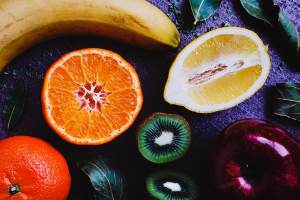Raw Foods Improve Mental Health, Studies Find

Raw foods, especially fresh fruits and veggies, have been shown to boost brain and mental health.
Mental health is often attributed to factors like genetics or trauma. But new research is now showing that eating more raw foods improves our mental health. In particular, fresh fruits and vegetables, which have been shown to help brain health in other studies.
According to the National Alliance on Mental Illness, one in five Americans are affected by mental health conditions. They compare it to a virus that is spreading across America.
According to the World Health Organization, approximately one in four people around the world will be affected by a mental health condition at some point in their lives. Yes, a quarter of us might have a mental health issue at some point.
The primary mental health conditions affecting people around the world are:
• Depression – an estimated 300 million people around the world are affected by depression.
• Bipolar affective disorder – an estimated 60 million people around the world have been diagnosed with bipolar issues.
• Schizophrenia – an estimated 23 million people are affected by some form of schizophrenia.
• Dementia – about 50 million people have been diagnosed around the world with some form of dementia. These include Alzheimer’s disease and other forms of dementia.
• Developmental disorders – childhood mental health issues include autism and other disorders that affect infants, toddlers and children of other ages.
On top of these issues there are many types of mood disorders. Mood disorders can range from premenstrual mood issues to menopausal to anger and relationship-related issues. Mood issues are rampant and most people have them at one time or another in our lives.
As shown in some of the articles linked within this list, diet has been linked to a number of these issues. Others have been found to be helped by certain herbs and other natural remedies.
This points to the relationship between what we eat and the health of our brain and mind.
In this article
Raw fruits and vegetables decrease mental disease
In a study from New Zealand’s University of Otago, researchers have found that eating certain raw fruits and vegetables improve our mental health. The research, headed by Dr. Tamlin Conner, tested 422 people who were between 18 and 25 years old living in the United States and New Zealand.
The subjects were given diet surveys and mental health questionnaires to establish their mental health. Symptoms that were tested for include:
• depression symptoms
• anxiety symptoms
• moods (positive and negative)
• life satisfaction
In terms of the moods, positive mood symptoms included being enthusiastic, excited, energetic, joyful, happy, cheerful, pleasant, good, relaxed, calm, content, and/or satisfied. Meanwhile, negative moods included feeling hostility, stress, irritable, angry, anxious, annoyed, nervous, tense, hopeless, unhappy, dejected, and/or sad.
In order to separate other relationships between mental health, the researchers also established the subjects’ sleep, body mass index, physical activity, smoking, socio-economic status and alcohol consumption. By separated the subjects’ mental health from these potential relationships. This helped the researchers isolate the relationship between diet and mental health.
Dr. Conner and her research team found that the more raw fruits and vegetables the subjects ate, the less mental health issues the subjects had. In particular, they found that greater raw fruit and veggie consumption led to reduced symptoms of depression, more positive moods and greater life satisfaction scores compared to those who ate less fresh fruit and vegetables.
The general result is that those who ate more raw fruits and veggies were found to be “flourishing” as compared to those who ate more processed foods. The only outlier was that those who ate more processed vegetables were found to have less depression symptoms compared to those who ate less vegetables in general. That also illustrates that when raw veggies aren’t available, processed ones are better than none.
But it is clear that raw fruits and vegetables are better. As stated by Psychology Doctoral Candidate Kate Brooks, part of the research team in this study:
“Our research has highlighted that the consumption of fruit and vegetables in their unmodified state is more strongly associated with better mental health compared to cooked/canned/processed fruit and vegetables.”
Which foods are better for mental health?
The researchers also ranked the foods that were most associated with improved mental health. Here is top ten list, ranked:
• carrots
• bananas
• apples
• dark leafy greens
• spinach
• grapefruit
• lettuce
• citrus fruits
• berries
• cucumber
• kiwifruit
While cooked foods were not as helpful as raw fruits and vegetables, a few cooked foods got close. These included:
• Asparagus
• Broccoli
• Dark leafy greens
• Sweet potato
• Zucchini
• Onions/leeks
• Eggplant/Aubergine
As far as foods that were most associated with poor mental health, these included any processed meals and foods in general. But significant offenders included candy, French fries and soda.
Healthy foods and mental health in other research
There are a few other studies that have shown that our food choices can indeed help our mental health. For example, a 2016 study from the University of Sydney tested 2,334 people over 55 years old and 1,952 people over 60 years old. The researchers found that those with the highest vegetable consumption had a 41 percent lower incidence of depression symptoms. They also found a similar correlation between fruit and vegetable consumption and depression.
The scientists also found that those whose diets had more fiber consumption also had lower incidence of depression.
A 2014 study from Yonsei University in the Republic of Korea found that healthy food choices improved moods.
For this research the scientists conducted four experiments that tested foods and moods. Their research found that healthy foods produced more positive moods compared to “indulgent foods.”
A few other studies have found similar relationships.
Why are raw foods better for our brain and mind?
The bottom line of these studies is clear: Eating raw fruits and vegetables improves our moods and reduces the risk of depression and anxiety. Why?
The reason relates to the micronutrients – or phytochemicals – that are contained in fruits and vegetables. The word ‘phyto’ refers to “plant.”
Researcher Kate Brooks highlighted this in her comments:
“This likely limits the delivery of nutrients that are essential for optimal emotional functioning,”
Phytochemicals for brain health

Fresh fruits contain phytochemicals that help the brain.
These include polyphenols such as flavonoids, phenolic acids, stilbenes;, carotenoids such as beta-carotene, zeaxanthin and beta-cryptoxanthin; tocopherols and tocotrienols; and many others.
Many of these micronutrients from foods are heat-sensitive. This means that when the foods are cooked, many of these micronutrients will be lost. The cooked foods will no longer contain the micronutrient. Or the cooked food will contain significantly less of the compound.
Then of course there are a variety of other nutrients. These include all the vitamins and minerals that we typically see on nutrient panels of our vitamin supplements.
There are a number of good food-source supplements that contain many of these vitamins and minerals. But because many of these are also heat-sensitive, supplements will not contain the same nutrient found in raw foods.
A good example of this is vitamin E. A vitamin supplement will typically contain alpha-tocopherol. But as we’ve discussed, there are many other forms of vitamin E found in raw foods. These include:
• αlpha-tocopherol
• beta-tocopherol
• gamma-tocopherol
• delta-tocopherol
• αlpha-tocotrienol
• beta-tocotrienol
• gamma-tocotrienol
• delta-tocotrienol
As shown in the research linked above, these forms of vitamin E have a number of great benefits that alpha-tocopherol alone doesn’t have. Many of these forms of vitamin E are heat-sensitive.
And that is only one example. There are literally thousands of different compounds found in raw fruits and vegetables. And many of these are heat sensitive.
The solution is obvious from the research above. For these and other studies, the World Health Organization recommends that we eat between five and eight servings of fresh fruits and vegetables every day. This equate, according to their research, to between 400 grams and 600 grams of raw fruits and vegetables.
If we follow the examples of scientists, and eat at least five servings of raw fruits and vegetables every day, we will have better protection against mental health issues.
Scientific References
Brookie KL, Best GI, Conner TS. Intake of Raw Fruits and Vegetables Is Associated With Better Mental Health Than Intake of Processed Fruits and Vegetables. Front Psychol. 2018 Apr 10;9:487. doi: 10.3389/fpsyg.2018.00487.
Raw fruit and vegetables provide better mental health outcomes: Otago research. Univ of Otago. 2018 April.
Gopinath B, Flood VM, Burlutksy G, Louie JC, Mitchell P. Association between carbohydrate nutrition and prevalence of depressive symptoms in older adults. Br J Nutr. 2016 Dec;116(12):2109-2114. doi: 10.1017/S0007114516004311.
Gardner MP, Wansink B, Kim J, Park SB. Better moods for better eating?: How mood influences food choice. Jour Cons Psych. 2014 Jan 25.
Rodriguez-Casado A. The Health Potential of Fruits and Vegetables Phytochemicals: Notable Examples. Crit Rev Food Sci Nutr. 2016 May 18;56(7):1097-107. doi: 10.1080/10408398.2012.755149.















